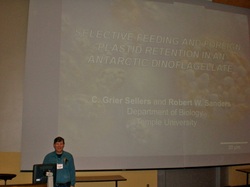On August 10, 2015 I presented the following paper to the annual meeting of the Phycological Society of America, held at Drexel University in Philadelphia, PA: Sellers, C.G., Gast, R.J., and Sanders, R.W. "Dark Survival and Recovery of a Foreign Organelle Retaining Dinoflagellate and its Haptophyte Prey and Plastid Source Following a Simulated Austral Winter."
During August 2014 I was awarded a Ph.D. in Biology by Temple University.
Sellers, C.G., Gast, R.J., and Sanders, R.W. "Selective Feeding and Foreign Plastid Retention in an Antarctic Dinoflagellate," was published in the Journal of Phycology, 50(6): 1081-1088.
On August 2, 2013 Dr. Robert W. Sanders presented some the preliminary results of our ongoing study of changes in abundance and photosynthetic function of the Ross Sea dinoflagellate and its algal prey, Phaeocystis antarctica during and following the darkness of the austral winter. The paper, "Responses of a Kleptoplastidic Antarctic Dinoflagellate and its Prey to an Extended Period of Darkness" was authored by C. Grier Sellers, Rebecca Gast, and Robert W. Sanders, and was presented to the International Congress of Protistology in Vancouver, B.C., Canada.

- From March 23-25th, 2012 I attended a symposium at the University of Massachusetts, Amherst, MA: “Celebrating a Life in Science: In Memory of Lynn Margulis.” Lynn, who died in November of 2011 was a mentor to me and is still an inspiration. It was because of her that I first became interested in protistology and symbiosis.
- In July of 2011 several members of the Sanders Lab and I had the good fortune to attend a joint meeting of the International Society of Protistologists and the Phycological Society of America. It was held at the University of Washington in Seattle, WA, where I gave the following talk:
Sellers, C.G. and Sanders, R.W. "Selective Feeding and Foreign Plastid Retention in an Antarctic Dinoflagellate."
The abstract of this presentation has been published in the Journal of Phycology, 47: S48.
My travel to the meeting was partly supported by a Holz-Connor Travel Grant awarded by the International Society of Protistologists.
